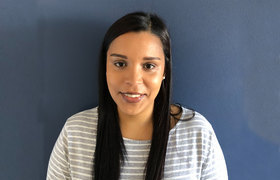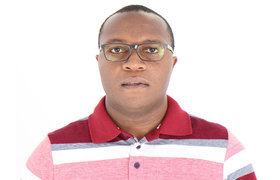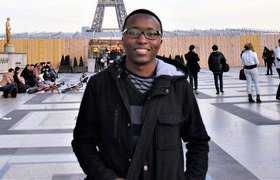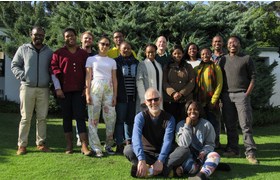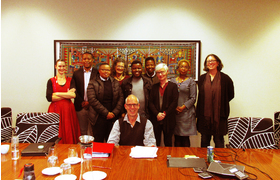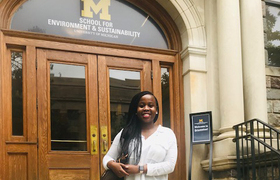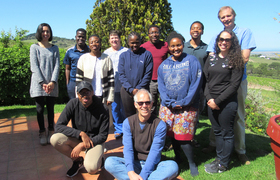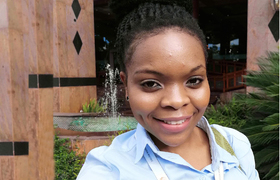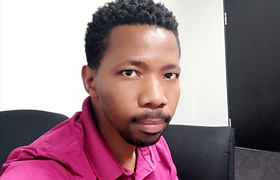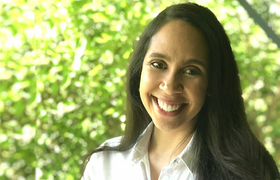Envisioning a bright future
10 December 2018 | Story Kim Cloete. Photo Je’nine May. Read time 9 min.
Rising University of Cape Town (UCT) academic Mochelo Lefoka grew up in the small village of Makgodu in Limpopo, with his grandparents as his strength and inspiration. They instilled in him a sense of pride in his work and an understanding of the opportunities education could bring.
Fast-forward to today and Lefoka is a scholar in the New Generation of Academics Programme (nGAP) at UCT, sponsored by the Department of Higher Education and Training, and is ever grateful for his elders’ guidance.
“My grandparents didn’t have any academic stripes of their own, but they wanted me to go far. They always said, ‘Make something of yourself’, work hard and get involved in school to the best of your capabilities,” he recalled.
Two years ago, he was nominated for the nGAP initiative, which nurtures and mentors promising young black academics in higher education. His talent and enthusiasm helped to win him a spot on the programme in 2017 as an Employment Equity (EE) employee at UCT in the Department of Construction Economics and Management (CEM).
Lefoka is now a lecturer in the department, which is in the Faculty of Engineering & the Built Environment (EBE), while simultaneously studying towards his master’s in construction management.
“In the first three years of the programme you have to obtain your master’s degree, and then in the next three years you have to enrol for a PhD qualification,” he explained.
“I loved working with people, particularly from varying backgrounds, but all with a common objective in mind.”
In a sense this is a return home for Lefoka, who completed his undergraduate and honours degrees in the same faculty. He has come back to academic life after four years in the construction industry, during which he got to grips with the costing and planning of major projects around South Africa as well as the grit and reality of construction work.
“I fell in love with it. I enjoyed getting my hands dirty. I loved working with people, particularly from varying backgrounds, but all with a common objective in mind,” he said.
Lefoka was assigned to work with a small team at Durban harbour and was later seconded to the Port of East London, before a job as a project manager brought him back to Cape Town.
Nuts and bolts
A new chapter beckoned when he heard about nGAP, and he decided to apply. He was excited about the opportunity to combine his experience in the industry with teaching and research.
“I understand what nuts and bolts you need to operate in the industry. I think my experience could help students to fully understand what is expected of them when they commence working.”
Before long, he was given a taste of teaching first-, second- and third-year construction and property students, and he now thrives on it.
“As much as I am teaching, I learn so much from the students too. They’re very smart. They come from different parts of the world, so students from the DRC [Democratic Republic of the Congo], Mozambique and the United States for instance all have a different understanding and experience of how things work.
“My classrooms are really lively. We go through two hours in what seems like 10 seconds. It is crazy, but I love it.”
“My classrooms are really lively. We go through two hours in what seems like 10 seconds.”
Juggling teaching and research with studying is no mean feat. The nGAP has helped to keep him grounded, with mentors and advisers offering guidance and motivation through the entire experience.
He has also drawn inspiration from the “golden croutons” of advice offered by esteemed professors and leaders in his field as well as from other faculties.
“The transition from industry to academia can be hard. The nGAP is a perfect transitional package. It’s allowed me to survive and thrive. The journey so far has been amazing. It’s given me space to do research and develop as an academic.”
First international paper
Writing retreats form an integral part of the programme. Mentors and advisers support emerging academics in their writing endeavours, from working on their theses to preparing manuscripts for publication.
Academics in the nGAP across several faculties go away together on the retreats. It’s an opportunity to get stuck into some good, hard work, and then to reflect on it later.
“At a writing retreat you can be at a table with someone in politics, in anthropology and in infectious diseases. It’s incredible finding out about other people’s stories and what they are involved in.”
Lefoka has also successfully moved into the research space. His first international paper, written in collaboration with Professor Abimbola Windapo from CEM, won the Singapore Institute of Building Limited (SIBL) Best Paper Award at a conference in Singapore this year.
“It has given me confidence. Doing well in my first international paper made me believe that I could leave a footprint in the research space. Your research can become a critical element of what industry needs.”
“Doing well in my first international paper made me believe that I could leave a footprint in the research space.”
Infectious enthusiasm
His infectious enthusiasm and lightness of being has not gone unnoticed. nGAP’s programme director Dr Robert Morrell said Lefoka is the kind of person who has the potential to strengthen, reorient and energise the country’s higher education system.
“This is not just because of his intellectual curiosity and his determination to convert that curiosity into new ideas, new ways of thinking and of doing.
“It is also because in his approach to opportunity and his fellow human beings, he personifies an optimism about the future, a good and open-hearted belief in the goodness of people – and a capacity to see joy and to laugh uproariously.”
Playing a part in the transformation of the educational landscape is something that pleases Lefoka. He feels he is also in a good position to mix the traditional with the contemporary.
“We are that generation that sits in the middle of traditional construction and a technologically geared space. I was trained in a traditional way, but over the last 10 years, technology has taken over. I hope I can be that person that helps students to appreciate new ways of doing things in the built environment.”
Innovative and fresh ways of doing things have always intrigued him. His interest in construction was piqued at an early age, when he came across the popular TV programme, Extreme Makeover.
“I was hooked. I loved their idea of building a house for a family in dire need. I also enjoyed the design aspect, where every room is tailor-made and has a different ambience.”
Lefoka has turned his interest in construction into something concrete, while also living up to the hopes of his grandmother.
“My grandmother always wanted me to be a teacher. And although I took a different route to begin with, now I finally am one.”
His interests expand beyond the classroom, into African fiction, swimming in the ocean, spending time with his family and friends, and embracing the minutiae of everyday life.
“Life is to be explored, even in the small things. I like to open a door for someone, start a conversation in a bus or while waiting for coffee. There’s always something to learn.”
 This work is licensed under a Creative Commons Attribution-NoDerivatives 4.0 International License.
This work is licensed under a Creative Commons Attribution-NoDerivatives 4.0 International License.
Please view the republishing articles page for more information.
New Generation of Academics Programme (nGAP)
UCT has responded energetically to the New Generation of Academics Programme (nGAP), an opportunity provided by the Department of Higher Education (DHET) to build a new generation of black South African academics. The DHET’s 2015 vision document, “Staffing South Africa’s Universities Framework: A comprehensive, transformative approach to developing future generations of academics and building staff capacity”, proposes a suite of initiatives to address the challenge, with nGAP being the major instrument to increase the numbers of black South African academics.
The programme “involves the recruitment of highly capable scholars as new academics, against carefully designed and balanced equity considerations and in light of the disciplinary areas of greatest need”. The nGAP scholars are appointed into permanent positions where from the outset their conditions are customised to ensure their successful induction into the ranks of established academics.
The DHET provides funding over a six-year period to support the appointment of an nGAP lecturer, and their time is protected to provide the best possible opportunity for the completion of a doctorate degree in the shortest possible time. Once the degree is completed, the nGAP lecturer’s teaching commitments are steadily increased until they shoulder a full teaching load.
Since the first advertisement for nGAP posts in 2015, UCT has been awarded 17 nGAP positions: 5 (Phase 1), 4 (Phase 2), 3 (Phase 3) and 5 (Phase 4). These are distributed across all faculties.
UCT’s nGAP scholars operate as a single cohort, managed and coordinated by Dr Robert Morrell. Lecturers meet for quarterly meetings, writing retreats and various capacity-building activities all designed to support the completion of postgraduate qualifications (particularly doctorates) and to develop records of achievement that will testify to their emergence as self-standing, excellent academics. Each lecturer is mentored by a senior scholar, who provides support and guidance on the challenges that routinely face academics.
The nGAP manager sets great store in building the cohesion of the cohort and encouraging the establishment of new UCT networks while producing a collaborative, mutually supportive and embracing work culture.
According to Dr Morrell, “This group of academics will lead UCT in 15 to 20 years’ time ... Their vision of excellence, of being African and South African, of serving a wider community and producing knowledge for the planet, the continent and the country, will power UCT in years to come.”
Newsletters
In the news
